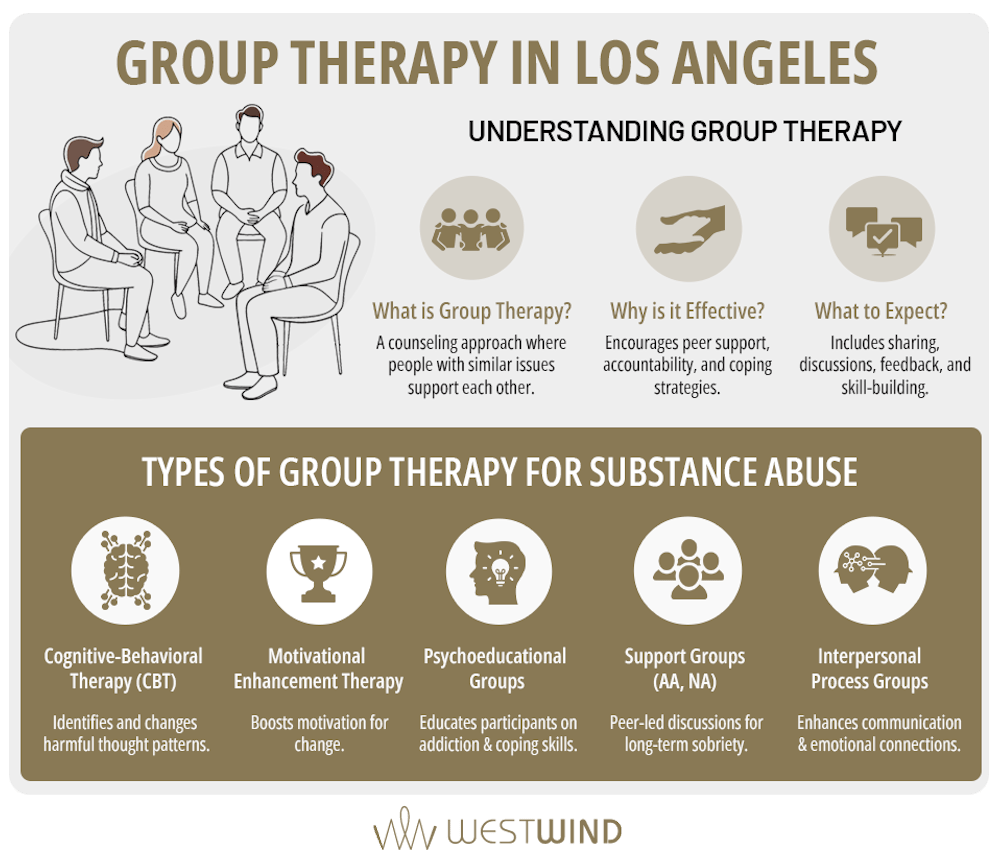
Group therapy is a form of counseling that helps people with similar issues work through their problems together. It can be an effective treatment for substance abuse, as it provides a support group and allows people to share their experiences with others who understand what they are going through.
There are different types of group therapy, such as cognitive-behavioral group therapy, which helps people change the way they think about and cope with their addiction. There are also 12-step groups, such as Alcoholics Anonymous, which provide support and guidance for recovery.
Group therapy can be an effective treatment for substance abuse because it provides a supportive environment where people can share their experiences and learn from each other. It can also help people develop new coping mechanisms to handle the challenges of recovery, and give them a sense of belonging and community. Overall, group therapy can be an extremely beneficial tool in helping people overcome addiction and move forward with their lives.
What Can I Expect During Group Therapy for Substance Abuse?
During group therapy, you will meet with a group of people who are struggling with similar issues. You will be encouraged to share your thoughts and experiences openly and honestly, and to give and receive feedback from other group members.
The group leader will start discussions and help group members explore their feelings and beliefs about addiction and recovery. Group therapy can be an extremely powerful experience, and it can be helpful to have the support of others who understand what you are going through.
Group therapy in Los Angeles is a powerful tool for people struggling with substance abuse, as it can help participants build supportive relationships with others who are going through similar experiences. This group dynamic can provide accountability and encouragement at a time when many people may feel isolated or alone in their struggles.
Additionally, group therapy can also help individuals develop new coping skills and ways of thinking about themselves and their addiction, which may make them more likely to stay focused on their recovery goals over the long term.
That said, group therapy does come with some challenges as well. For example, group sessions often involve sharing personal experiences and feelings with other group members – something that not everyone feels comfortable doing.
What Are the Different Types of Group Therapy for Substance Abuse?

Some common examples include 12-step programs like Alcoholics Anonymous or Narcotics Anonymous, as well as group counseling sessions led by mental health professionals. Each type of group therapy has its unique benefits and challenges, so finding the one that best fits your needs is an important step in your recovery journey.
- Psychoeducational groups.
- Skill development groups.
- Cognitive-behavioral therapy groups.
- Support groups.
- Interpersonal process groups
Psychoeducational Group Therapy
Psychoeducational group therapy is a type of group therapy that focuses on providing group members with education and skill-building to help them better understand and manage their substance abuse issues.
This type of group therapy may involve discussing the effects that addiction can have on an individual’s physical, emotional, social, and financial well-being, as well as learning about helpful strategies for managing cravings, avoiding relapse triggers, and setting realistic goals.
Skill Development Group Therapy
In skill development group therapy, group members work together to build or improve upon specific skills needed to successfully manage their substance use disorder. This type of group therapy may involve working on various skills such as coping strategies, communication skills, problem-solving techniques, anger management skills, and stress management skills.
Cognitive-Behavioral Group Therapy
Cognitive-behavioral group therapy is useful in helping group members identify and correct distorted thinking patterns that may contribute to their substance use disorder. This type of group therapy also helps group members learn healthy coping and problem-solving skills.
Motivational Enhancement Group Therapy
Motivational enhancement group therapy is designed to help group members increase their motivation to change their substance use behaviors. This type of group therapy involves exploring the individual’s thoughts, feelings, and beliefs about substance use and recovery.
Interpersonal Process Group Therapy
Interpersonal process group therapy focuses on improving the way group members interact with others. This type of group therapy can help manage conflict, develop empathy, and improve communication skills.
Support Groups
Support groups are used to provide emotional and social support for group members. These groups are typically peer-led and do not involve professional therapists. Alcoholics Anonymous (AA) and Narcotics Anonymous (NA) are examples of support groups.
What’s the Difference Between a Support Group and Group Therapy?
The difference between a support group and group therapy is that a support group provides emotional and social support to individuals struggling with addiction, while group therapy is a form of psychotherapy that helps individuals address the underlying issues that may have contributed to their substance use.

What Are the Responsibilities of the Leader During Group Therapy?
The responsibilities of the group leader during group therapy for substance abuse typically include setting group goals, creating a safe and supportive environment for group members, providing feedback and encouragement to group members, and monitoring group dynamics.
Group leaders must also be able to identify potential issues that may arise during group therapy, such as group conflict or resistance to change. Additionally, group leaders should have training in interventions specific to substance abuse treatment, such as motivational interviewing and contingency management.
Group therapy is a type of psychotherapy that involves a group of people working together with a therapist to address common issues related to addiction. This form of therapy can help individuals struggling with substance abuse by offering support, guidance, and accountability while they work through the recovery process.
The Value of Psychotherapy in Substance Abuse Recovery
Psychotherapy is an essential part of substance abuse recovery. It can help individuals struggling with addiction by providing support, guidance, and accountability while they work through the recovery process. Additionally, psychotherapy can help individuals to understand and address the underlying issues that may have contributed to their addiction.
46.2% of U.S. adults with mental illness received treatment in 2020. 64.5% of U.S. adults with serious mental illness received treatment in 2020.32.1% of U.S. adults with mental illness also experienced a substance use disorder in 2020 (17 million individuals).
The majority of people with a substance abuse disorder in California are aged 18 to 25 years old. There are 2,195 active substance abuse treatment centers in the state of California. California’s drug rehab treatment centers service 96,960 patients annually. 83,534 patients enrolled in California drug rehab outpatient services annually.
Why is Socialization Important in Substance Abuse Recovery?
Socialization is critical in early sobriety because it helps people develop a support system and form healthy relationships. It can also provide a distraction from thoughts and cravings, and give people a sense of purpose and belonging.
In group therapy, people can socialize with others who are going through similar experiences and learn how to cope with the challenges of recovery together. This can be an extremely helpful way to stay on track in recovery and avoid relapse.
How Effective is Group Therapy for Substance Abuse?
The effectiveness of group therapy for substance abuse is supported by a number of studies, which have shown that group therapy can help individuals struggling with addiction address the underlying issues that may have contributed to their substance use.
Many group therapy programs focus on cognitive-behavioral and motivational interviewing techniques, both of which are effective in helping group members recognize the negative impacts of their substance use and strategize ways to change these behaviors. Additionally, group therapy participants often receive peer support from other group members who are also in recovery.
What If I Don’t Feel Comfortable with Group Therapy for Substance Abuse?
If you don’t feel comfortable discussing your substance abuse issues in a group setting, there are other options for treatment. Individual therapy, for example, offers a more private setting in which to address these issues. Family therapy or couples counseling may also be beneficial if you’re struggling to repair relationships that have been damaged by your addiction. Ultimately, the most important thing is that you get the help you need to recover from addiction and live a healthy, sober life.
Embrace Change at Westwind Recovery®
If you are interested in group therapy for substance abuse, there are several different approaches that you can explore depending on your specific needs and preferences. Group therapy can be an incredibly effective tool for those seeking recovery from addiction, as it provides a safe space where individuals can share their experiences and receive guidance from mental health professionals and other group members.
Whether you are considering group therapy as part of your own recovery journey or want to learn more about group therapies for substance abuse, there are resources available to help you get started. Westwind Recovery® understands that your voice deserves to be heard and wishes to guide you through the process. If you or a loved one are struggling with addiction, contact our facility in Los Angeles today!

Dr. Deena is the Chief Clinical Officer of Westwind Recovery®, an award-winning outpatient treatment center in Los Angeles where she oversees the clinical and administrative program and treatment methods. Dr. Deena is a doctor of psychology and licensed clinical social worker since 1993. LCSW #20628. Originally from the East Coast, Dr. Deena has worked running treatment centers, worked as a therapist in psychiatric hospitals as well as school settings and currently has a thriving private practice in the LA area. Dr. Deena has appeared regularly on the Dr. Phil Show as an expert since 2003. She has also been featured on many other TV shows, podcasts and has contributed to written publications as well as podcasts.



